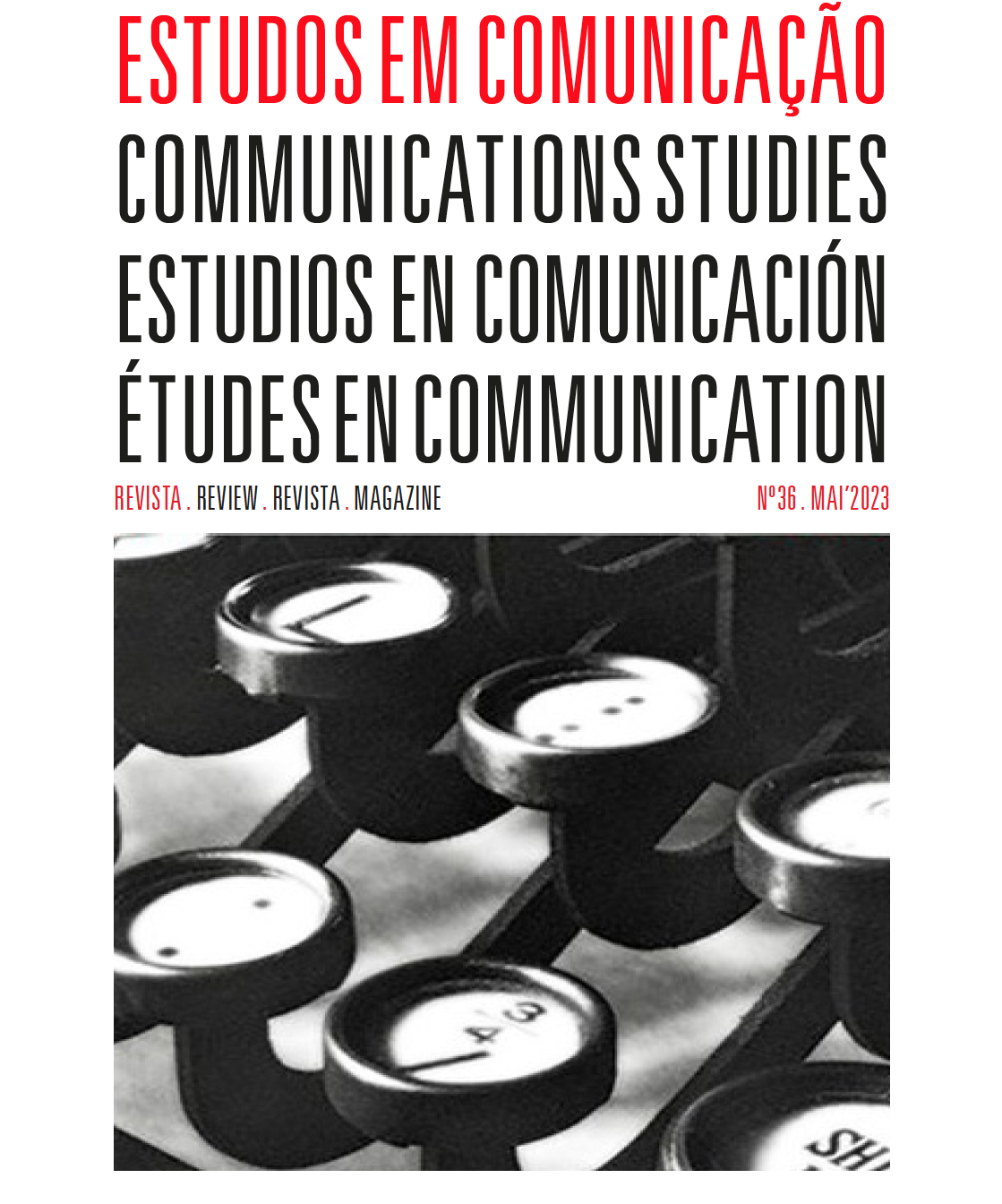Myths and Contemporary Journalism - Contributions to a scientific approach to indexing the journalistic content to myths: the systematization of a referential matrix for reading mythology in newspapers
Keywords:
Communication, Culture, Context background, Journalism, Myths.Abstract
Do myths exist? Are they incorrect? Are myths the opposite of science? And can, or should, contemporary science take the mythological into account when talking about cultural sciences and communication sciences? The concept of myth is framed. Some characteristics based on semiology and structuralism are systematized, phenomenology is being paid attention to, and some perspectives of psychoanalysis are framed. The myth in communication processes is also framed. A reflection on the presence of myths in contemporary cultural and communication environment is carried out. Examples of the existence of myths in modern reality are given and some questions are considered: the deontology of journalism obliges it to factuality. Is mythological present in contemporary journalism? Some newspapers are analysed and a referential matrix for a mythological reading in the written press is suggested.References
Anderson, B. ([1991] 2017). Comunidades Imaginadas: Reflexões sobre a origem e a expressão do nacionalismo. Coleção História e Sociedade. Lisboa: Edições 70.
Barthes, R. (1957). Mitologias. Coleção Signos. Lisboa: Edições 70.
Barthes, R. (1985). A aventura Semiológica. Lisboa: Edições 70.
Barthes, R. (1989). Aula. São Paulo: Cultrix.
Baudrillard, J. (2010). A Sociedade de Consumo. Lisboa: Edições 70.
Benjamin, W. ([1980] 2012) Sobre Arte, Técnica, Linguagem e Política. Lisboa: Relógio D’Água.
Berger, P. & Luckmann, T. (1999). A Construção Social da Realidade: um livro sobre a sociologia do conhecimento. Lisboa: Dinalivro.
Bird, S, & Dardeene, W. (1987). Myth, Chronicle, and Story: Exploring the Narrative Qualities of News in Sage Annual Reviews of Communication Research. Vol 15. Media, Myths, nad Narratives: Television and Press. Sage Publications. Pp67-86.
Bourdieu, P (2005). A Economia das Trocas Simbólicas. 6ª ed. São Paulo: Perspectiva. Bourdieu, P ([2011] 2018). O Poder Simbólico. Coleção História e Sociedade. Lisboa: Edições 70.
Corrêa, R. (2016). Região Cultural - um tema fundamental in IBEROGRAFIAS, Revista de Estudos Ibéricos. nº 12, ano XII, pp: 9-20.
Correia, J. (1998). A Região e o Espaço Público: Um contributo crítico. in Regionalização : textos oportunos / coordenador António dos Santos Pereira. - Covilhã: Universidade da Beira Interior.
Correia, J.(2004). A Teoria da Comunicação de Alfred Schutz. Colecção Média e Jornalismo. Lisboa: Livros Horizonte
Damásio, A. ([1999] 2013). O Sentimento de Si: Corpo, Emoção e Consciência. Col. Temas e Debates. Lisboa: Círculo de Leitores;
Damásio, A. ([2003] 2012). Ao Encontro de Espinosa: As emoções sociais e a neurologia do sentir. Col. Temas e Debates. Lisboa: Círculo de Leitores;
Dorfles, G. (1965). Novos Ritos, Novos Mitos. Col. Arte e Comunicação. Lisboa: Edições 70;
Eliade, M. (1963). Aspectos do Mito. Col. Prspetivas do Homem. Lisboa: Edições 70.
Fromm, E (1976). A Linguagem Esquecida: Uma Introdução ao Entendimento dos Sonhos, Contos de Fadas e Mitos. 6ª edição. Rio de Janeiro:Zahar Editores;
Geertz, C. (1989). A interpretação das culturas. Rio Janeiro: Editora Gunabara Koogan.
Habermas, J. ([1981] 2013). A modernidade: um projeto inacabado. Lisboa: Nova Vega.
Han, B. (2016) No enxame: reflexões sobre o digital. Lisboa: Relógio D’Água
Harvey, D. (1992). A Condição Pós-moderna. São Paulo: Loyola.
Husserl, E. ([1901] 2007). Investigações lógicas. Vol 1-2. Lisboa: Centro de Filosofia da Universidade de Lisboa.
Habermas J. ([1980] 2013). A Modernidade: Um projeto inacabado. Lisboa: Nova Vega;
Kerckhove, Derrick.(1997) A pele da cultura. Lisboa: Relógio D'Água.
Lévi-Strauss, C. ( [1978] 2018) Mito e Significado. Lisboa: Edições 70
Lipovetsky, G & Charles, S. (2014). Os Tempos Hipermodernos. Lisboa: Edições 70.
Lippmann, W. ([1922] 2008). Opinião Pública. Col. Clássicos da Comunicação Social. Rio de Janeiro: Vozes;
Lynch, K. (1960). A Imagem da Cidade. Lisboa. Edições 70.
MacLuhan, M. (1964). Os meios de comunicação como extensões do Homem. São Paulo: Cultrix.
Martins, M. (2017). Imagem e Pensamento. (2ª edição). Vila Nova de Famalicão: Húmus
Merleau-Ponty, M. ([1945] 1994). Fenomenologia da percepção. São Paulo: Martins Fontes.
Merleau-Ponty, Maurice (1991). Signos.Lisboa: Martins Fontes.
Mlodinow, L. ([2012] 2014]. Subliminar: Como o inconsciente controla o nosso comportamento. Queluz de Baixo: Marcador;
Rodrigues, A. (1999). O campo dos Media: Discursividade, narratividade, máquinas. Lisboa: Veja.
Rodrigues, A. (2000). Guarda: Pré-História, História, Arte (Monografia). Guarda: Edição Santa Casa da Misericórdia.
Schutz, A. (1970). Reflections on the problema of relevance. New Haven: Yale University Press.
Schutz, A. (1971). Collected papers, II, Studies in Social Theory. The Hague: Martinus Nijhoff
Schutz, A. (1971). Collected papers, III, Studys in Phenomenologiccal Philosofy. The Hague: Martinus Nijhoff.
Downloads
Published
Issue
Section
License
Estudos em Comunicação/Communication Studies is an Open Access journal. All its content is freely available without charge to the user or his institution. Users are allowed to read, download, copy, distribute, print, search, or link to the full texts of the articles in this journal without asking prior permission from the publisher or the author. Estudos em Comunicação, by Labcom, is licensed under a Creative Commons Atribuição-NãoComercial-SemDerivações 3.0 Unported License. By submitting your work to Estudos em Comunicação/Communication studies you confirm you are the author and own the copyright, that the content is original and previously unpublished, and that you agree to the licensing terms.


